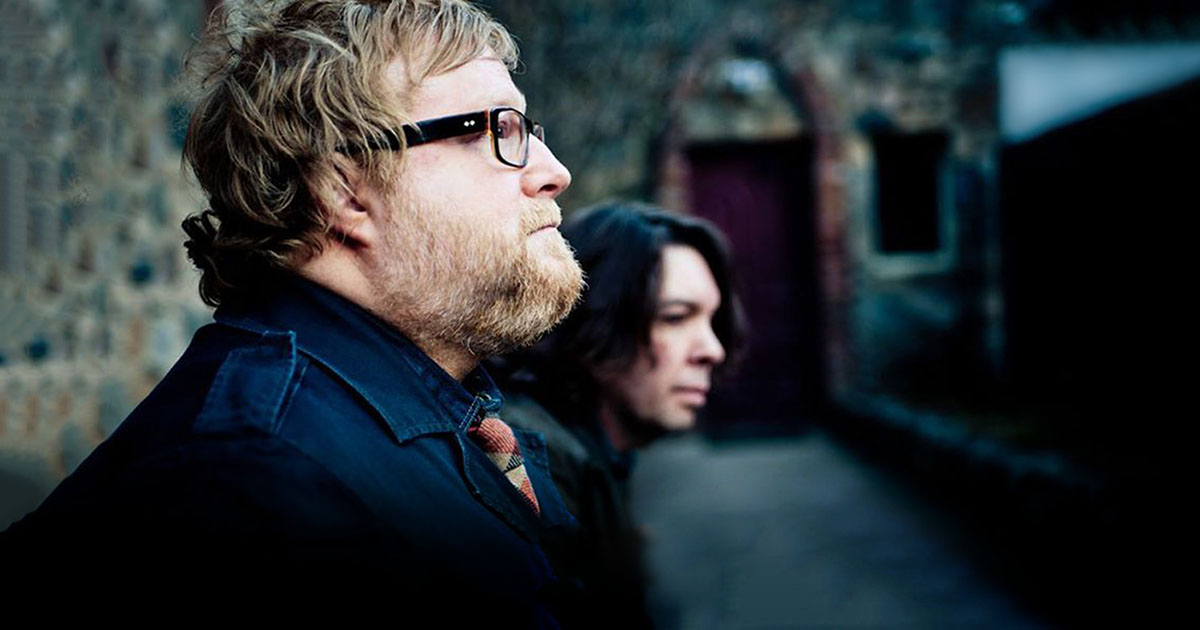Hammock Swing Out of Pandemic with Love In the Void, Echoes February CD of the Month
 The shoegaze sound of 1980s bands like Slowdive and My Bloody Valentine has had a lasting influence on musicians right up until today. And none were inspired more than the Nashville duo of Marc Byrd and Andrew Thompson, who are Hammock. They reveled in reverb-drenched guitars and layers of distortion on their early releases.
The shoegaze sound of 1980s bands like Slowdive and My Bloody Valentine has had a lasting influence on musicians right up until today. And none were inspired more than the Nashville duo of Marc Byrd and Andrew Thompson, who are Hammock. They reveled in reverb-drenched guitars and layers of distortion on their early releases.
But that sound evolved in the second decade of this century, beginning with the album Departure Songs in 2012. The jangle of shoegaze gave way to a layered and heavily processed approach that made electric guitars sound like a darkly hued symphony orchestra emerging from the liquid depths of your subconscious. From Oblivion Hymns in 2013 to Everything and Nothing, Mysterium, Universalis and Silencia in 2019, they created albums that were like electric requiem masses driven by death, loss and deep existential questions. There’s a reason why Ricky Gervais used their music all over his brilliant Netflix series, Afterlife.
With the 2021 digital-only release of Elsewhere, they began to emerge from their often mournful and sometimes sonically oppressive dirges with a more open sound. That culminates in their latest release, Love in the Void. Some changes are evident instantly. Where their guitars barely sounded like guitars on that previous quintet of albums, here, guitars are ringing out, sounding like the rock instruments they are. There’s even a fairly unadorned plaintive acoustic guitar on “Untruth.” That gives way to a Pink Floydish, slow rhythm, with a delayed guitar calling to you from some point deep in your memory. One of the five songs with lyrics, it picks up on themes of death and loss that have marked their work in the last decade.
 Drums have also returned in a big, crashing way, driving crescendos of songs like “Release” right up to its razor blade conclusion. This dynamism is intentional. “Love in the Void is a reaction to everyone telling us how much they sleep to our music,” Marc Byrd proclaimed to me. “And Andrew said, ‘It’s time to wake up.'”
Drums have also returned in a big, crashing way, driving crescendos of songs like “Release” right up to its razor blade conclusion. This dynamism is intentional. “Love in the Void is a reaction to everyone telling us how much they sleep to our music,” Marc Byrd proclaimed to me. “And Andrew said, ‘It’s time to wake up.'”
But the album does begin in a deceptive calm with “Procession,” a short ambient wash of distorted voice-like sounds against an increasingly swooning pad. It’s like they are paving the way for you from the world you’re in, “asleep,” into the world they are about to create. That leads into the title track. It begins gently enough, with arpeggio guitars in deep reverb and a slow, almost pensive, drum rhythm. But it ends in a serrated storm of fuzzed out guitars in deep, roiling layers, before washing out on a fade of distortion. “Wake up!” indeed.
Hammock were never ones to avoid the epic, and they get there several times on the album including “It’s Ok to Be Afraid of the Universe.” The longest track on the disc at almost 10-minutes, it progresses through a few movements, as ringing guitars build up to a crescendo that drops you into free floating space, before Jake Finch’s drums kick in to drive it through another section of layer upon layer of reverb-stretched guitars, topped by twanged-out Telecaster leads.
Hammock often deal in metaphysical issues, which can sometimes be gleaned from their titles, and from their occasional lyric songs. Although even there, vocals are buried in reverb and tucked under a wave of sustained guitars. Their lyrics are sometimes spare, as on “It’s in This Lie.” The four words of the title are its only lyrics, sung in an anguished tone against a storm-trooper groove.
More heart-rending is “Undoing,” a song about addiction and ill-advised choices. As Marc Byrd sings “I do it to myself,” the song is one of the more rocking on the album, with a sliding 4/4 groove. Then Byrd’s wife Christine Byrd (of Lumenette) comes in, first singing harmony vocals and then calling out in a voice of comfort, like Kate Bush on Peter Gabriel’s “Don’t Give Up,” but more like a descending angel.
Hammock’s Love in the Void sounds like an album from a band who has emerged from a long dark tunnel. The music they made in that tunnel was deep and immersive, wrapping you in a cocoon of sound. But as beautiful as that sound was, I often felt smothered in it. But Love in the Void carries you on a lighter plane, and I suspect that it’s an album I’ll be listening to much more.
